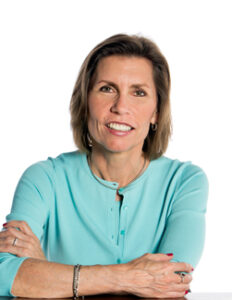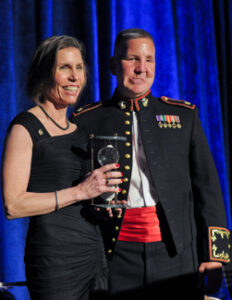By Teresa Fausey
How an Army of Volunteers is Helping Veterans Deal with the Psychological Effects of Combat

Barbara Van Dahlen, founder and president of Give an Hour.
Barbara Van Dahlen didn’t start out to found a new organization, lead a movement, receive scads of citations and awards, or be named one of TIME magazine’s 100 Most Influential People in the World for 2012.
What she did want to do was find a way to help members of the military and returning veterans deal with the mental health issues that often result from deployment to a war zone. She says she simply “saw a need and tried to fill it.”
After earning her PhD in clinical psychology from the University of Maryland, Dr. Van Dahlen built a very successful clinical practice in the Washington, D.C. area. Over the next two decades, she specialized in the diagnosis and treatment of children, which often meant interacting with and coordinating services in large systems like school districts and mental health clinics. For several years, she was also an adjunct professor at George Washington University, where she trained and supervised developing clinicians. So what made her decide to take on a project like Give an Hour™?
“One morning as I was dropping my five-year-old off at school, I heard that a plane had flown into the towers,” said Barbara.
As the fighting in Afghanistan and Iraq escalated, she says “the idea was bubbling around inside my head” that people deployed there would require help dealing with the psychological effects of the experience. But what really spurred her to act was this simple, but important, question posed by her older daughter, who noticed homeless veterans on a Washington D.C. street one day: “Mom, we’re the richest country in the world. Why are all these vets homeless?”
“That was it,” said Barbara. “I had to do something!”
And she did. In 2005, Dr. Barbara Van Dahlen founded Give an Hour, a network of mental health volunteers that provides services to U.S. troops and veterans, as well as their families and communities. The idea is to “give an hour” of psychological counseling free of charge to someone who needs help, but is having difficulty accessing services through the VA or other programs.
“At first, there was some suspicion of and resistance to the effort, but as people came to understand what we do and who we are, the response has been overwhelmingly positive,” says Barbara. “The network currently includes approximately 7,000 mental health volunteers from across the country who have provided more than 104,000 hours of counseling.”
In addition to making services more available, Give an Hour also works to remove the stigma that psychological counseling still carries in many quarters—a stigma that may keep many members of the military and returning combat veterans from reaching out for help that could improve their personal and professional lives.
Although the main focus of Give an Hour remains military personnel, veterans, and their families, the organization has broadened its scope and responded whenever a special need arises. For example, after the shootings at Sandy Hook Elementary School in Connecticut, Give an Hour opened its network to victims, first responders, and others affected by the shootings. Some providers came from across the country at their own expense to help people in that community deal with the horrific events of December 14, 2012.
Today, in addition to the 7,000 mental health professionals who volunteer their time, about 800 non-mental-health volunteers—graphic designers, event organizers, communications professionals, and others—help Give an Hour continue to grow and evolve. And partnerships with organizations such as the American Psychiatric Association, American Psychological Association, National Association of Social Workers, Team Rubicon, Got Your 6 campaign, Clinton Global Initiative, Wounded Warrior Project™, and others are helping Give an Hour reach even more people in need.
One Hero’s Story
“Asking for help is a sign of strength, not weakness. I encourage anyone, especially anyone coming back from war, to ask for help if they need it.”
– Justin Constantine, Lieutenant Colonel, U.S. Marine Corps

Lieutenant Colonel Justin Constantine receives award.
After earning his law degree at the University of Denver in 1998, Justin Constantine joined the U.S. Marine Corps where he served as a judge advocate until 2004, when he transitioned from active duty to Marine Reservist. In 2006, Justin volunteered to serve in Iraq, and while on a routine patrol there, he was shot and seriously injured. In addition to his physical injuries, he was left with post traumatic stress disorder.
When the VA was unable to provide counseling sessions that fit his work schedule, Justin reached out to Give an Hour. “It was an easy process,” says Justin. “My counselor is great, the schedule is flexible, and I can come for as long as I want. My wife says she notices the difference when I haven’t had a session in awhile. My life and my relationships have really benefitted.”
Entrepreneur, published author, and frequent speaker, Justin heads The Constantine Group and serves as a senior advisor for the U.S. Chamber of Commerce. The Honor Graduate of his class at the Marine Corps Command and Staff College, he is currently completing a Master of Laws program at Georgetown University and serves on the boards of directors of Give an Hour and the Wounded Warriors Project™.
Click here to learn more about Give an Hour.






